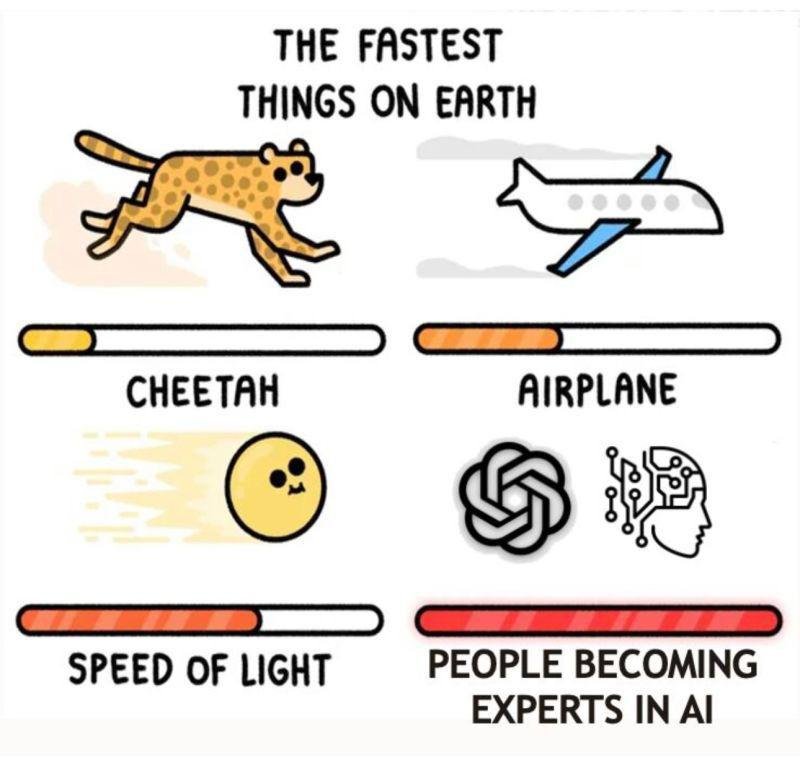There are no AI experts(?)
AI Signal vs Noise, Part 2.
It all feels a bit unreal, right? AI is everywhere, and nowhere, all at once. If your experience is at all like mine, there’s a strong sense of urgency to understand the potential of AI in our work and our lives, driven by the deluge of opportunistic expert advice flowing from all corners of the internet. It’s also hard to know the practical applications beyond a few niche, but cool, use cases.
Who really knows what’s going here? Most people don’t, in fact even the people who have created these AI technologies don’t fully understand how they work. Headlines speak of dire warnings, and incredible promises, but where’s the current truth?
We’re keen to understand how AI affects customer experiences and expectations, a part of the conversation we’re not seeing a whole lot (though Skift just released this report), so I thought we could start to make sense of it together.
It’s all moving so fast, no one is an expert in this area yet and to begin to build expertise we need to slow things down for a minute.
The smartest people I know try to understand before they attempt to be understood. And they tend to process information first by breaking it down into categories or frameworks to make it relatable, before making it actionable.
In that spirit, we’d like to understand your perspectives on AI as it stands right now, through this brief and anonymous survey. Please share your questions, concerns, and priorities so that we can use them to guide the conversation ongoing. Further, we’re planning to host a live roundtable discussion about AI in the coming weeks — click here to if you’re interested and want more info on that.
As we gather your input we’re working to organize our thinking related to the business of recurring revenue customer experiences. Here’s our starting point on priorities and perspectives which will evolve realtime:
https://www.houseofkaizen.com/ai-at-hok
feel free to review, comment and consider for your own use…
The “Intern” perspective
As we start to understand the application of these technologies, we may be drawn to its potential to do our work for us. But how do we instruct AI to do our work well enough that its actually helpful? A clever person I know suggested we think about it as a new intern.
An eager new intern is looking to learn and willing to work hard, but our expectation of their work is relatively low and the effort to instruct them is relatively high while the output is likely to be inconsistent — but that’s what internships are for. Similarly with AI, our current expectations should be the same. How can we provide training, improve our management skills, while extracting some contribution of value to the organization?
What I like about this perspective is that it highlights the need to invest in our own learning as managers first and then in the AI as the trainee, in order to gain more valuable contributions from it. Currently AI is doing incredible work for some and the potential is inspiring, but the experience for most of us right now is a bit clunky. It may be hard to see how we go from this stage to something of real value to our current roles and responsibilities. A first step is absolutely going to be establishing rules of engagement which we’ve seen the CEO of OpenAI advocate for in Congress and newsrooms grapple with in realtime - 50% of newsrooms are using AI and only 20% have guidelines)
I’m enjoying all that there is to learn about AI right now but as it relates to growing a recurring revenue product business, I’m grounding my enthusiasm for with the core questions of value to the consumer:
Does AI solve our customer's need?
Is the interface limited to chatbots?
Is AI best suited for acquisition, engagement or retention?
Should AI products be free or paid?
What’s the risk of fraud to our customers or our brand?
In the next email on this topic I’ll share some of your questions in response the survey and we can dig into those topics of greatest interest to you. I look forward to it.
Thanks
- Matt
P.S. last week we had a great SubscriptionWorks AMA with Eric Hellweg of One Medical — he shared some fantastic insights about customer centered design for digital and IRL experiences…
Q: What do you find most effective in helping to inform customer centered design?"
A: “Being clear about how much fidelity you need in the results — do you just need directional guidance? Do you need statistical significance?”
SubscriptionWorks members click here to see the discussion. (Not yet a member? Click here to join)
Did you find this email worth your time?
🤩 Worth it | 😕 Meh | 🙄 Nope
The HoK community is truly incredible, and word-of-mouth referrals are a huge help. If you found this email worth your time, please pass it on to others who might as well. Many thanks to those of you who already have! 🙏
Did someone forward this email to you?
Subscribe for free if you’re into it.

